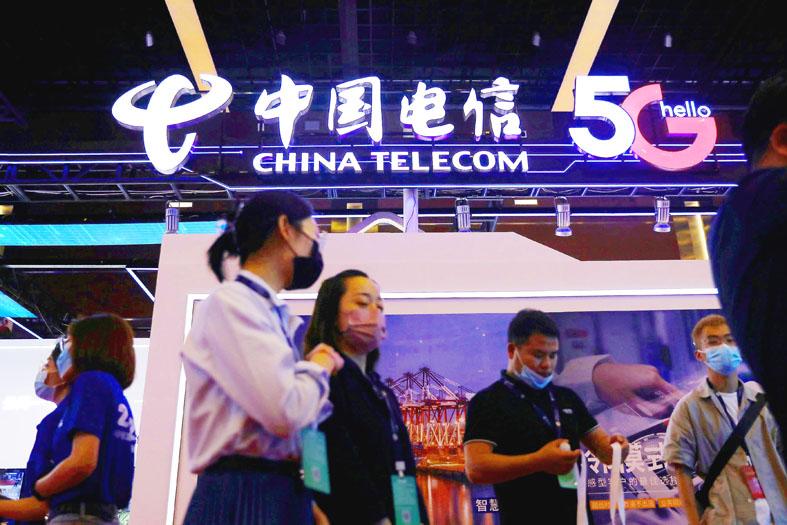China Telecom Corp (中國電信), one of the three Chinese telecom carriers booted off the New York Stock Exchange, is planning to raise 47.1 billion yuan (US$7.3 billion) from a listing in Shanghai that is set to be the world’s biggest so far this year.
The A-shares were priced at 4.53 yuan apiece, above the company’s book value of 4.49 yuan each. The fundraising by China’s largest fixed-line operator is the biggest stock sale this year globally, exceeding the US$6.3 billion initial public offering in Hong Kong by TikTok rival Kuaishou Technology (快手) in February.
China Telecom was one of three of China’s big state-owned carriers whose American depositary receipts were delisted by the New York Stock Exchange in May, following an executive order issued by former US president Donald Trump barring US investments in companies with ties to the Chinese military.

Photo: Reuters
The pivot to raise funds on home turf comes as Beijing extends a crackdown on local companies that are listing abroad and as tensions between the US and China continue to ratchet up.
However, China Telecom, which went public in Hong Kong and New York in 2002, has had to scale back its fund raising in Shanghai. The sale of 10.4 billion A shares in the offering, excluding a greenshoe option, is down from the 12.1 billion it had said it would initially sell in April.
Still, if the Chinese firm exercises an over-allotment option, it could raise as much as 54.2 billion yuan from the sale, it said in a statement to the exchange.
China Telecom’s listing would help it diversify financing channels, analysts said. The telecom titan needs to ramp up funding as it backs China’s ambitions to lead in building investment-heavy super-fast 5G networks.
The company is expected to continue benefiting as growth in China’s mobile subscription base recovers along with a digital transformation drive, Jefferies analysts Edison Lee, Lydia Lin and Chi Tsai wrote in a note.
After the A-share listing, “we estimate CT will turn from a net debt position of 30 billion yuan last year to a net cash position of 21.5 billion yuan,” they wrote.
Proceeds from the Shanghai IPO would be used to build a high bandwidth industrial 5G platform, cloud-network integration, a new information infrastructure project, and research and development, China’s Telecom said in a filing to the Shanghai Stock Exchange. Chinese brokerages China International Capital Corp (中國國際金融) and CITIC Securities Co (中信證券) are joint sponsors for the listing.

When an apartment comes up for rent in Germany’s big cities, hundreds of prospective tenants often queue down the street to view it, but the acute shortage of affordable housing is getting scant attention ahead of today’s snap general election. “Housing is one of the main problems for people, but nobody talks about it, nobody takes it seriously,” said Andreas Ibel, president of Build Europe, an association representing housing developers. Migration and the sluggish economy top the list of voters’ concerns, but analysts say housing policy fails to break through as returns on investment take time to register, making the

EARLY TALKS: Measures under consideration include convincing allies to match US curbs, further restricting exports of AI chips or GPUs, and blocking Chinese investments US President Donald Trump’s administration is sketching out tougher versions of US semiconductor curbs and pressuring key allies to escalate their restrictions on China’s chip industry, an early indication the new US president plans to expand efforts that began under former US president Joe Biden to limit Beijing’s technological prowess. Trump officials recently met with their Japanese and Dutch counterparts about restricting Tokyo Electron Ltd and ASML Holding NV engineers from maintaining semiconductor gear in China, people familiar with the matter said. The aim, which was also a priority for Biden, is to see key allies match China curbs the US

NOT TO WORRY: Some people are concerned funds might continue moving out of the country, but the central bank said financial account outflows are not unusual in Taiwan Taiwan’s outbound investments hit a new high last year due to investments made by contract chipmaker Taiwan Semiconductor Manufacturing Co (TSMC, 台積電) and other major manufacturers to boost global expansion, the central bank said on Thursday. The net increase in outbound investments last year reached a record US$21.05 billion, while the net increase in outbound investments by Taiwanese residents reached a record US$31.98 billion, central bank data showed. Chen Fei-wen (陳斐紋), deputy director of the central bank’s Department of Economic Research, said the increase was largely due to TSMC’s efforts to expand production in the US and Japan. Investments by Vanguard International

STRUGGLING TO SURVIVE: The group is proposing a consortium of investors, with Tesla as the largest backer, and possibly a minority investment by Hon Hai Precision Nissan Motor Co shares jumped after the Financial Times reported that a high-level Japanese group has drawn up plans to seek investment from Elon Musk’s Tesla Inc to aid the struggling automaker. The group believes the electric vehicle (EV) maker is interested in acquiring Nissan’s plants in the US, the newspaper reported, citing people it did not identify. The proposal envisions a consortium of investors, with Tesla as the largest backer, but also includes the possibility of a minority investment by Hon Hai Precision Industry Co (鴻海精密) to prevent a full takeover by the Apple supplier, the report said. The group is